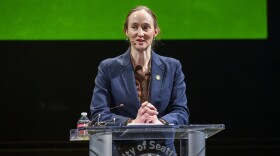Donald Trump will be sworn in Friday. One issue rural America is looking for answers on is public lands: how they’re managed and whether the government should transfer them to states or even sell them off.
President-elect Trump may not be keen on the idea to hand federal land over to states. At least that’s what he told Field and Stream magazine a year ago. He said something similar last spring to the editor of Petersen’s Hunting Magazine prior to his nomination as the GOP’s presidential candidate.
“Our land is not in the condition that it used to be, so we’ll put it back into condition, but we’re not looking to sell off land,” Trump said.
Trump recently nominated Montana Rep. Ryan Zinke to head up the U.S. Department of the Interior -- the nation’s federal land management agency. Zinke has been outspoken about his opposition to a change in ownership, but earlier this month the Congressman voted in favor of a rule change that would make land transfers easier.
A movement to reclaim federal land was highlighted in the Northwest by the 41-day standoff at Oregon’s Malheur National Wildlife Refuge last year, where even local lawmakers got on board.
But in other rural parts of the region, Northwesterners are only looking for more access and better management of federal land
Public land… and the public
Just south of the sleepy northeast Washington towns of Usk and Cusick, the Crossroads Cafe sits at a fork in the road where two state highways merge. It’s where a handful of locals gather every morning. They say they’re only in it for the coffee, but they linger for a few hours to talk about politics and reminisce about the days when this region boomed with industrial jobs and active sawmills.
It was a time when Lloyd Hastings said he felt the most free. But now, he said, “You gotta have a permit to carry a gold pan on federal land. How silly. Who came up with that?”
Hastings believes that once land is deemed public, it’s held in trust for public use, then the public should be allowed to do what they want on it.
“They definitely should have a say on it, but they aren’t being asked anything,” Hastings said. “It’s just everything they say is being poked down their necks.”
Opinions differ among the group, but nearly all of them agree tight budgets have much to do with what they see as mismanagement and declining forest health.
“It’s been mismanaged so badly for so many years, that it’s going to take a lot of natural occurrences for it to ever get back to where it ought to be,” Hastings said.
Budgets struggles at both levels
Forests in northeastern Washington state are in desperate need of thinning and they are extremely prone to wildfire. Hastings said perhaps a large fire might offer a more immediate solution in comparison to the red tape and bureaucracy he says has plagues land management.
In an October interview, Washington’s outgoing Commissioner of Public Lands Peter Goldmark said land management dollars at all levels of government are lacking.
“We haven’t been successful as of yet in persuading the federal government to really match funding on a dollar per acre what we have been able to do, which is not enough quite frankly,” Goldmark said. “They’re struggling with their own budget.”
That struggle trickles down to states and it’s why Jack Schubert - another local at the cafe - said he doesn’t want federal land ownership to change.
“Absolutely not,” he said. “They’d sell it off as soon as they had to balance their budget, whenever they needed the money, that’s why. That’s how the state does things.”
It remains unclear where desperately needed funding to improve forest health and access might come from, but in his interview with Petersen’s Hunting Magazine, Trump seemed keen to leave his mark saying, “We are going to be good stewards for the land.”



Copyright 2017 Northwest News Network






